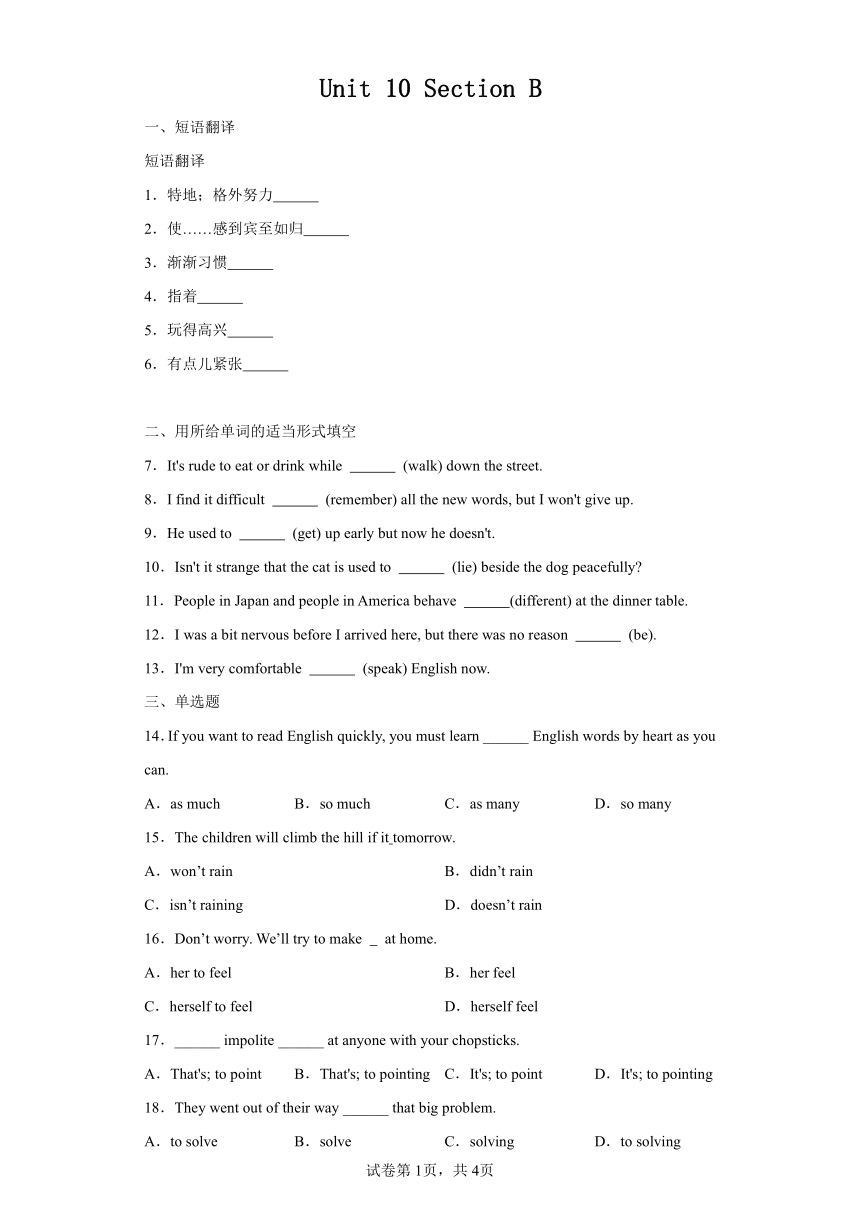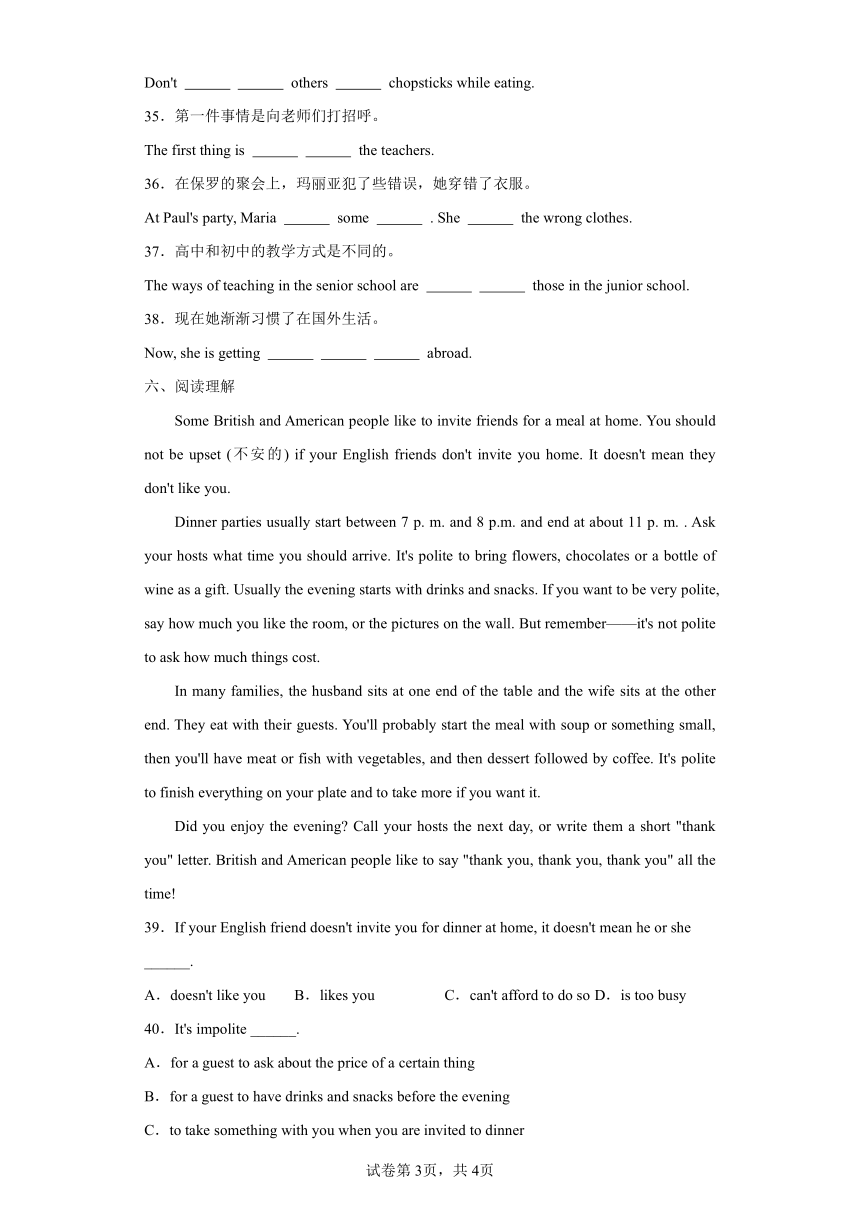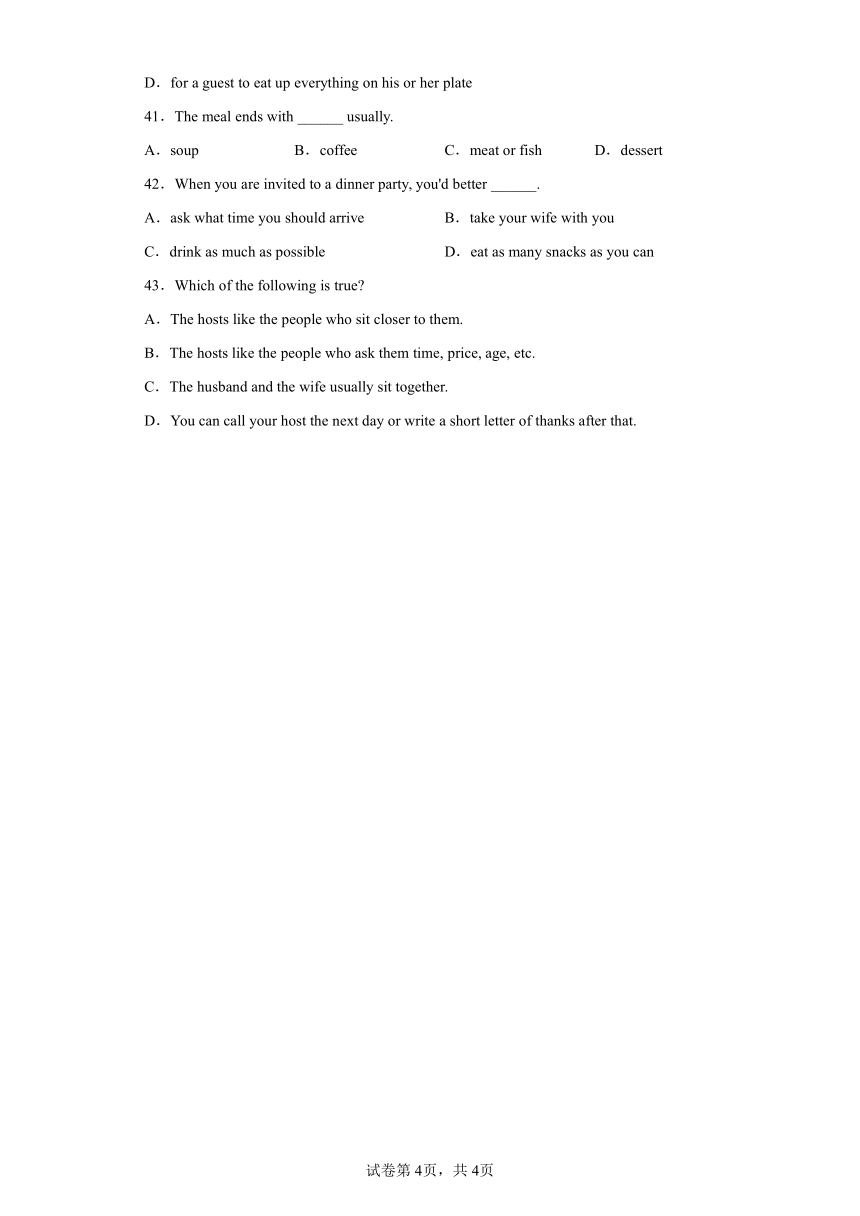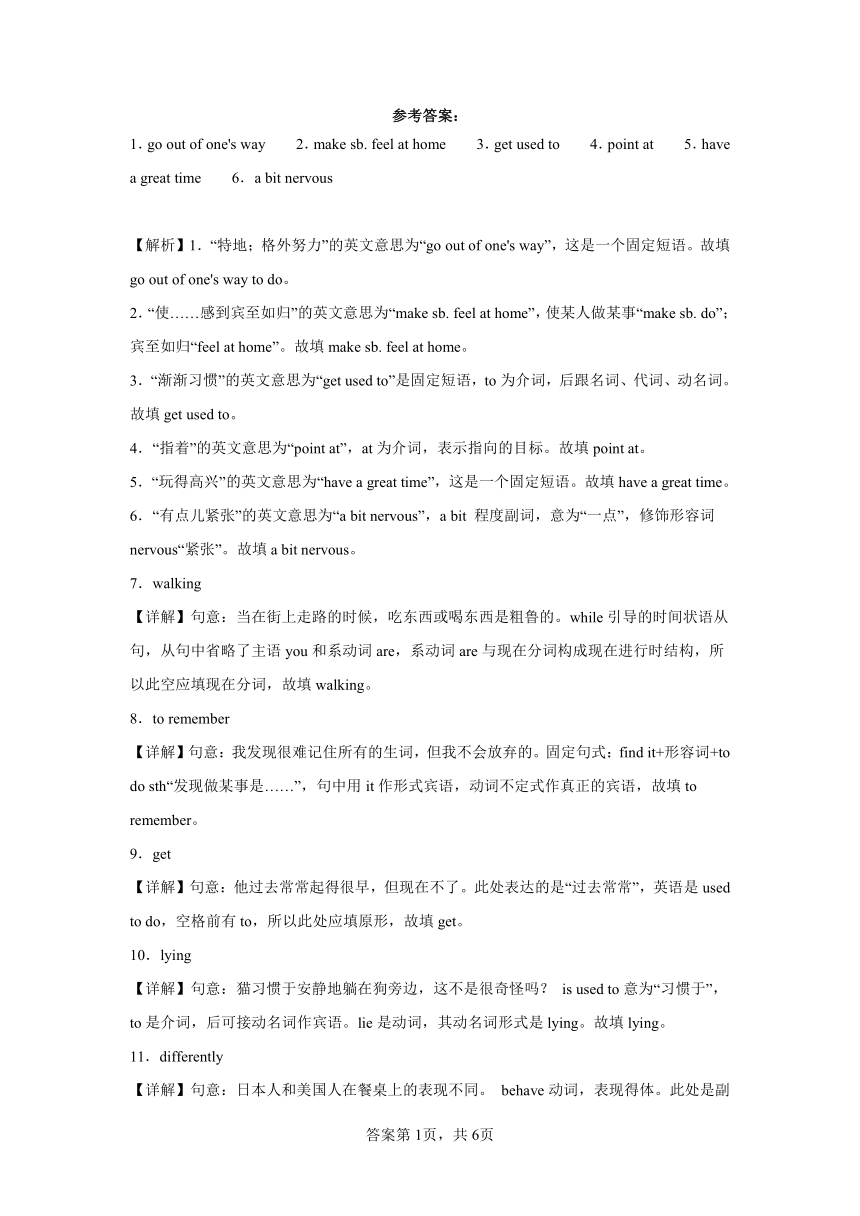Unit 10 You're supposed to shake hands.SectionB练习(含解析)
文档属性
| 名称 | Unit 10 You're supposed to shake hands.SectionB练习(含解析) |  | |
| 格式 | docx | ||
| 文件大小 | 26.9KB | ||
| 资源类型 | 教案 | ||
| 版本资源 | 人教新目标(Go for it)版 | ||
| 科目 | 英语 | ||
| 更新时间 | 2023-12-05 11:09:42 | ||
图片预览





文档简介
Unit 10 Section B
一、短语翻译
短语翻译
1.特地;格外努力
2.使……感到宾至如归
3.渐渐习惯
4.指着
5.玩得高兴
6.有点儿紧张
二、用所给单词的适当形式填空
7.It's rude to eat or drink while (walk) down the street.
8.I find it difficult (remember) all the new words, but I won't give up.
9.He used to (get) up early but now he doesn't.
10.Isn't it strange that the cat is used to (lie) beside the dog peacefully
11.People in Japan and people in America behave (different) at the dinner table.
12.I was a bit nervous before I arrived here, but there was no reason (be).
13.I'm very comfortable (speak) English now.
三、单选题
14.If you want to read English quickly, you must learn ______ English words by heart as you can.
A.as much B.so much C.as many D.so many
15.The children will climb the hill if it tomorrow.
A.won’t rain B.didn’t rain
C.isn’t raining D.doesn’t rain
16.Don’t worry. We’ll try to make at home.
A.her to feel B.her feel
C.herself to feel D.herself feel
17.______ impolite ______ at anyone with your chopsticks.
A.That's; to point B.That's; to pointing C.It's; to point D.It's; to pointing
18.They went out of their way ______ that big problem.
A.to solve B.solve C.solving D.to solving
19.The peaceful music in the CD made the students ________ relaxed.
A.feel B.feels C.felt D.to feel
20.— Could you give me some on how to learn English
— Sure. Practice makes perfect.
A.advice; good B.suggestions; good C.advice; well D.suggestion; well
21.—All the workers went home yesterday ________ Mr. Brown. Why
—Because he was on duty.
A.except B.besides
C.except for D.beside
22.You are supposed to ______ smoking, ______ you will get ill.
A.go on; so B.give up; or C.stop; so
23.You should ______ here at 7:00 this morning. But you arrived at 8:00.You were late.
A.have arrived B.arrived C.arrive D.had arrived
24.—Thanks ______ joining the Talk Show!
—You're welcome.
A.by B.on C.of D.for
25.Don't eat the noodles______ your hands. Here you are. The chopsticks.
A.about B.for C.of D.with
26.I ask you to sit down ______ table, not to sit down ______ the table.
A.at; in B.at; at C.on; to D.in; in
27.Please don't point ______ anyone ______ chopsticks.
A.to; on B.in; at C.at; with D.with; for
28. I find___________hard to learn English well.
A.this B.it C.that D.they
四、根据句意和首字母提示写出所缺的单词
29.The restaurant is open every day e Monday.
30.The box is e________and there’s nothing in it.
31.I went to the bank to e some US dollars.
32.The boy is very naughty. He should learn how to b well.
33.I didn't know how to improve my writing skills. So the teacher gave me many s .
五、根据汉语完成下列英语句子
34.吃饭时不要用筷子指着别人。
Don't others chopsticks while eating.
35.第一件事情是向老师们打招呼。
The first thing is the teachers.
36.在保罗的聚会上,玛丽亚犯了些错误,她穿错了衣服。
At Paul's party, Maria some . She the wrong clothes.
37.高中和初中的教学方式是不同的。
The ways of teaching in the senior school are those in the junior school.
38.现在她渐渐习惯了在国外生活。
Now, she is getting abroad.
六、阅读理解
Some British and American people like to invite friends for a meal at home. You should not be upset (不安的) if your English friends don't invite you home. It doesn't mean they don't like you.
Dinner parties usually start between 7 p. m. and 8 p.m. and end at about 11 p. m. . Ask your hosts what time you should arrive. It's polite to bring flowers, chocolates or a bottle of wine as a gift. Usually the evening starts with drinks and snacks. If you want to be very polite, say how much you like the room, or the pictures on the wall. But remember——it's not polite to ask how much things cost.
In many families, the husband sits at one end of the table and the wife sits at the other end. They eat with their guests. You'll probably start the meal with soup or something small, then you'll have meat or fish with vegetables, and then dessert followed by coffee. It's polite to finish everything on your plate and to take more if you want it.
Did you enjoy the evening Call your hosts the next day, or write them a short "thank you" letter. British and American people like to say "thank you, thank you, thank you" all the time!
39.If your English friend doesn't invite you for dinner at home, it doesn't mean he or she ______.
A.doesn't like you B.likes you C.can't afford to do so D.is too busy
40.It's impolite ______.
A.for a guest to ask about the price of a certain thing
B.for a guest to have drinks and snacks before the evening
C.to take something with you when you are invited to dinner
D.for a guest to eat up everything on his or her plate
41.The meal ends with ______ usually.
A.soup B.coffee C.meat or fish D.dessert
42.When you are invited to a dinner party, you'd better ______.
A.ask what time you should arrive B.take your wife with you
C.drink as much as possible D.eat as many snacks as you can
43.Which of the following is true
A.The hosts like the people who sit closer to them.
B.The hosts like the people who ask them time, price, age, etc.
C.The husband and the wife usually sit together.
D.You can call your host the next day or write a short letter of thanks after that.
试卷第1页,共3页
试卷第1页,共3页
参考答案:
1.go out of one's way 2.make sb. feel at home 3.get used to 4.point at 5.have a great time 6.a bit nervous
【解析】1.“特地;格外努力”的英文意思为“go out of one's way”,这是一个固定短语。故填go out of one's way to do。
2.“使……感到宾至如归”的英文意思为“make sb. feel at home”,使某人做某事“make sb. do”; 宾至如归“feel at home”。故填make sb. feel at home。
3.“渐渐习惯”的英文意思为“get used to”是固定短语,to为介词,后跟名词、代词、动名词。故填get used to。
4.“指着”的英文意思为“point at”,at为介词,表示指向的目标。故填point at。
5.“玩得高兴”的英文意思为“have a great time”,这是一个固定短语。故填have a great time。
6.“有点儿紧张”的英文意思为“a bit nervous”,a bit 程度副词,意为“一点”,修饰形容词nervous“紧张”。故填a bit nervous。
7.walking
【详解】句意:当在街上走路的时候,吃东西或喝东西是粗鲁的。while引导的时间状语从句,从句中省略了主语you和系动词are,系动词are与现在分词构成现在进行时结构,所以此空应填现在分词,故填walking。
8.to remember
【详解】句意:我发现很难记住所有的生词,但我不会放弃的。固定句式:find it+形容词+to do sth“发现做某事是……”,句中用it作形式宾语,动词不定式作真正的宾语,故填to remember。
9.get
【详解】句意:他过去常常起得很早,但现在不了。此处表达的是“过去常常”,英语是used to do,空格前有to,所以此处应填原形,故填get。
10.lying
【详解】句意:猫习惯于安静地躺在狗旁边,这不是很奇怪吗? is used to意为“习惯于”,to是介词,后可接动名词作宾语。lie是动词,其动名词形式是lying。故填lying。
11.differently
【详解】句意:日本人和美国人在餐桌上的表现不同。 behave动词,表现得体。此处是副词修饰动词。different形容词,困难的,副词是differently“不同地”。故填differently。
12.to be
【详解】句意:我到这儿之前有点紧张,但没有理由紧张。no reason to do sth.“没有理由做某事”;此处是没有理由紧张,用动词不定式to be。故填to be。
13.speaking
【详解】句意:我现在说英语轻松自如。be comfortable doing sth做某事轻松自如,是英语中一个固定短语。故填speaking。
14.C
【详解】句意:如果你想把英语读快一点,你必须尽可能多地背英语单词。
考查比较级句型以及many和much的区别。as…as“和……一样”;其否定形式是:not as/so...as“……不如……样”。many修饰可数名词复数形式,much修饰不可数名词,这里空格后English words是可数名词的复数形式,所以应该用many修饰;故选C。
15.D
【详解】句意:如果明天不下雨,孩子们将会去爬山。
考查动词时态。if引导的条件状语从句,主句是一般将来时,从句用一般现在时表将来。故选D。
16.B
【分析】
【详解】句意:不要担心。我们将努力让她有宾至如归的感觉。
考查使役动词make用法。make sb. do sth.让某人怎样,make是使役动词,用省略to的不定式作宾语补足语,排除A/C选项,句子主语是we和宾语不一致,宾语用“her”。所以选B。
17.C
【详解】句意:用筷子指着任何人是不礼貌的。
考查it固定句型。point at指向,根据固定句型“It’s+形容词 +to do sth”,意为“做某事是……的”可知it是形式主语,动词不定式作真正的主语,故选C。
18.A
【详解】句意:他们不顾一切地去解决那个大问题。
考查非谓语动词。根据“They went out of their way…that big problem”,可知,不顾一切的目的是为了解决问题,用动词不定式作目的,故选A。
19.A
【分析】
【详解】句意:这个CD的平和的音乐使学生们感到放松。
考查使役动词make用法。短语make sb do sth.表示使某人做某事,make为使役动词,用省略to的不定式作宾语补足语,根据题意,故选A。
20.C
【详解】句意:——你能给我一些如何学好英语的建议吗?——当然,熟能生巧。
考查名词辨析及形容词副词用法。some后要用可数名词suggestion的复数形式或不可数名词advice,可先排除D;表示“学好英语”要用副词well来修饰动词learn,故答案为C。
21.A
【详解】句意:——除了布朗先生外,所有的工人昨天都回家了。为什么?——因为他在值班。
考查介词辨析。except除了,表示从所提到的人或事物中除去,except for用于非同类事物进行比较;besides除了,表示“除了……之外,还有……”,而beside表示在旁边。根据答语“Because he was on duty因为他在值班”,可知除了布朗先生值班外,其他工人都回家了,是同类比较,except符合语境,故选A。
【点睛】except和besides都可解作“除……之外”,但含义不同:except表示“从所提到的人或事物中除去,即从整体中除去一部分”,表示递减的概念,含义是否定的;besides表示“除了……之外,还有……”,指“在整体中加入一部分”,表示递加的概念,含义是肯定的。注意:二者用于否定句时含义相同,意思是一样的。eg. He did nothing besides (=except) this. 除这件事外,他什么事也没做。
22.B
【详解】句意:你应该戒烟,否则你会生病的。
考查动词短语和连词辨析。go on继续;give up放弃;stop停止;so因此、所以,表示因果关系;or否则,表示转折。be supposed to do sth“应该做某事”,根据smoking,以及后半句“you will get ill”,可知此处应是give up smoking“戒烟”,否则“你会生病的”,前后句之间是转折关系,因此第二个空用or连接;故选B。
23.A
【详解】句意:你本应该今天早上7点到这里的。但是你8点到的。你迟到了。
考查虚拟语气。根据后文“8点到,你迟到了”可推测,本应该7点到;should have done是虚拟语气,表示“本应该做某事,但实际没有做”。故选A。
24.D
【详解】考查固定搭配。Thanks sb. for sth. /doing sth.“为做某事而感谢某人”。句意“—谢谢来参加访谈节目。—不客气。”故选D。
25.D
【详解】句意:不要用你的手吃面,给你,这双筷子。
考查介词辨析。about关于,大约;for对于,为了;of……的;with和,用。eat…with…“用……吃”。eat the noodles with your hands“用手吃面”。故选D。
26.B
【详解】句意:我让你坐下吃饭,不是让你坐在桌子旁。
考查介词固定搭配。at table“吃饭”;at the table“在桌旁”。第一空是坐下吃饭,第二空是在桌旁。故选B。
27.C
【详解】句意:请不要用筷子指着任何人。
考查介词。to朝,向;on在……上;in在……里面;at在……点时;with用;for为了;第一空指的是“指向”,英语是point at,而第二空表达的是“用筷子”,英语中表示用某种有形的工具用介词with,故选C。
28.B
【详解】句意:我发现学好英语很难。
固定句式:主语+find+it+形容词+to do sth,意思是谁发现做什么事情怎么样。故选B。
29.except
【详解】句意:除了星期一,这个商店每天都营业。根据题干,结合所给出的首字母提示,可知此处表达的是“除……之外”,英文表达是except,是介词,后可接名词。故填except。
30.empty
【详解】句意:盒子是空的,里面什么也没有。
由题干中的“里面什么也没有”可知,这个箱子是空的。故empty符合题意。故填empty。
31.exchange
【详解】句意:我去银行兑换一些美元。根据所给空前面的to可知,应该填的是动词原形,由前面的the bank可知,应该是兑换一些美元,exchange意为“兑换”,故填exchange。
32.behave
【详解】句意:这个男孩很淘气。他应该学会如何举止得体。how加动词不定式,放于动词后可作宾语,所以此空填动词原形。根据The boy is very naughty和首字母b,可知,他应该学会如何举止得体,behave是动词,意为“表现”。故填behave。
33.suggestions
【详解】句意:我不知道怎么提高我的写作技巧。所以,老师给了我很多建议。结合句意及首字母可知用“建议suggestion”,可数名词,因为前面有many,表许多,所以用复数形式;故填suggestions。
34. point at with
【详解】此处缺的是“指向”和“用”,英语中“指向”是一个固定短语point at,句子是一个祈使句,所以这里用动词原形,而“chopsticks”是有形的工具,英语中表达“用有形的工具”要用介词with,故填point;at;with。
35. to greet
【详解】此处缺的是“问候”,英语是动词greet,而空格是在句中作表语,所以应用不定式的形式,故填to greet。
36. made mistakes wore
【详解】根据句意及语境可知,此句是一般过去时;犯错make mistakes,make的过去式是made;穿wear,过去时是wore,故填made;mistakes;wore。
37. different from
【详解】中英文对比,此空缺少“不同的”的翻译。固定搭配:be different from“与……不同”,故填different;from。
38. used to living
【详解】“get used to doing sth.”意为“习惯于做某事”;to是介词,后接动名词作宾语。live是动词,意为“居住”。故填used to living。
39.A 40.A 41.B 42.A 43.D
【分析】本文介绍了英国人和美国人的用餐礼仪和习俗。
39.细节理解题。根据“You should not be upset (不安的) if your English friends don't invite you home. It doesn't mean they don't like you”,可知,如果你的英国朋友不邀请你去家里,并不意味着他们不喜欢你,故选A。
40.细节理解题。根据“But remember-it's not polite to ask how much things cost”,可知,询问东西的价格是不礼貌的,故选A。
41.细节理解题。根据“You'll probably start the meal with soup or something small, then you'll have meat or fish with vegetables, and then dessert followed by coffee”,可知,晚餐通常会以咖啡结束,故选B。
42.细节理解题。根据“Ask your hosts what time you should arrive.”可知,如果你被邀请参加一个晚宴,应该询问几点到,故选A。
43.推理判断题。根据“Did you enjoy the evening Call your hosts the next day, or write them a short "thank you" letter”,可知,你可以在第二天打电话给主人,或者写一封简短的感谢信,所以D选项表述正确,故选D。
答案第1页,共2页
答案第1页,共2页
一、短语翻译
短语翻译
1.特地;格外努力
2.使……感到宾至如归
3.渐渐习惯
4.指着
5.玩得高兴
6.有点儿紧张
二、用所给单词的适当形式填空
7.It's rude to eat or drink while (walk) down the street.
8.I find it difficult (remember) all the new words, but I won't give up.
9.He used to (get) up early but now he doesn't.
10.Isn't it strange that the cat is used to (lie) beside the dog peacefully
11.People in Japan and people in America behave (different) at the dinner table.
12.I was a bit nervous before I arrived here, but there was no reason (be).
13.I'm very comfortable (speak) English now.
三、单选题
14.If you want to read English quickly, you must learn ______ English words by heart as you can.
A.as much B.so much C.as many D.so many
15.The children will climb the hill if it tomorrow.
A.won’t rain B.didn’t rain
C.isn’t raining D.doesn’t rain
16.Don’t worry. We’ll try to make at home.
A.her to feel B.her feel
C.herself to feel D.herself feel
17.______ impolite ______ at anyone with your chopsticks.
A.That's; to point B.That's; to pointing C.It's; to point D.It's; to pointing
18.They went out of their way ______ that big problem.
A.to solve B.solve C.solving D.to solving
19.The peaceful music in the CD made the students ________ relaxed.
A.feel B.feels C.felt D.to feel
20.— Could you give me some on how to learn English
— Sure. Practice makes perfect.
A.advice; good B.suggestions; good C.advice; well D.suggestion; well
21.—All the workers went home yesterday ________ Mr. Brown. Why
—Because he was on duty.
A.except B.besides
C.except for D.beside
22.You are supposed to ______ smoking, ______ you will get ill.
A.go on; so B.give up; or C.stop; so
23.You should ______ here at 7:00 this morning. But you arrived at 8:00.You were late.
A.have arrived B.arrived C.arrive D.had arrived
24.—Thanks ______ joining the Talk Show!
—You're welcome.
A.by B.on C.of D.for
25.Don't eat the noodles______ your hands. Here you are. The chopsticks.
A.about B.for C.of D.with
26.I ask you to sit down ______ table, not to sit down ______ the table.
A.at; in B.at; at C.on; to D.in; in
27.Please don't point ______ anyone ______ chopsticks.
A.to; on B.in; at C.at; with D.with; for
28. I find___________hard to learn English well.
A.this B.it C.that D.they
四、根据句意和首字母提示写出所缺的单词
29.The restaurant is open every day e Monday.
30.The box is e________and there’s nothing in it.
31.I went to the bank to e some US dollars.
32.The boy is very naughty. He should learn how to b well.
33.I didn't know how to improve my writing skills. So the teacher gave me many s .
五、根据汉语完成下列英语句子
34.吃饭时不要用筷子指着别人。
Don't others chopsticks while eating.
35.第一件事情是向老师们打招呼。
The first thing is the teachers.
36.在保罗的聚会上,玛丽亚犯了些错误,她穿错了衣服。
At Paul's party, Maria some . She the wrong clothes.
37.高中和初中的教学方式是不同的。
The ways of teaching in the senior school are those in the junior school.
38.现在她渐渐习惯了在国外生活。
Now, she is getting abroad.
六、阅读理解
Some British and American people like to invite friends for a meal at home. You should not be upset (不安的) if your English friends don't invite you home. It doesn't mean they don't like you.
Dinner parties usually start between 7 p. m. and 8 p.m. and end at about 11 p. m. . Ask your hosts what time you should arrive. It's polite to bring flowers, chocolates or a bottle of wine as a gift. Usually the evening starts with drinks and snacks. If you want to be very polite, say how much you like the room, or the pictures on the wall. But remember——it's not polite to ask how much things cost.
In many families, the husband sits at one end of the table and the wife sits at the other end. They eat with their guests. You'll probably start the meal with soup or something small, then you'll have meat or fish with vegetables, and then dessert followed by coffee. It's polite to finish everything on your plate and to take more if you want it.
Did you enjoy the evening Call your hosts the next day, or write them a short "thank you" letter. British and American people like to say "thank you, thank you, thank you" all the time!
39.If your English friend doesn't invite you for dinner at home, it doesn't mean he or she ______.
A.doesn't like you B.likes you C.can't afford to do so D.is too busy
40.It's impolite ______.
A.for a guest to ask about the price of a certain thing
B.for a guest to have drinks and snacks before the evening
C.to take something with you when you are invited to dinner
D.for a guest to eat up everything on his or her plate
41.The meal ends with ______ usually.
A.soup B.coffee C.meat or fish D.dessert
42.When you are invited to a dinner party, you'd better ______.
A.ask what time you should arrive B.take your wife with you
C.drink as much as possible D.eat as many snacks as you can
43.Which of the following is true
A.The hosts like the people who sit closer to them.
B.The hosts like the people who ask them time, price, age, etc.
C.The husband and the wife usually sit together.
D.You can call your host the next day or write a short letter of thanks after that.
试卷第1页,共3页
试卷第1页,共3页
参考答案:
1.go out of one's way 2.make sb. feel at home 3.get used to 4.point at 5.have a great time 6.a bit nervous
【解析】1.“特地;格外努力”的英文意思为“go out of one's way”,这是一个固定短语。故填go out of one's way to do。
2.“使……感到宾至如归”的英文意思为“make sb. feel at home”,使某人做某事“make sb. do”; 宾至如归“feel at home”。故填make sb. feel at home。
3.“渐渐习惯”的英文意思为“get used to”是固定短语,to为介词,后跟名词、代词、动名词。故填get used to。
4.“指着”的英文意思为“point at”,at为介词,表示指向的目标。故填point at。
5.“玩得高兴”的英文意思为“have a great time”,这是一个固定短语。故填have a great time。
6.“有点儿紧张”的英文意思为“a bit nervous”,a bit 程度副词,意为“一点”,修饰形容词nervous“紧张”。故填a bit nervous。
7.walking
【详解】句意:当在街上走路的时候,吃东西或喝东西是粗鲁的。while引导的时间状语从句,从句中省略了主语you和系动词are,系动词are与现在分词构成现在进行时结构,所以此空应填现在分词,故填walking。
8.to remember
【详解】句意:我发现很难记住所有的生词,但我不会放弃的。固定句式:find it+形容词+to do sth“发现做某事是……”,句中用it作形式宾语,动词不定式作真正的宾语,故填to remember。
9.get
【详解】句意:他过去常常起得很早,但现在不了。此处表达的是“过去常常”,英语是used to do,空格前有to,所以此处应填原形,故填get。
10.lying
【详解】句意:猫习惯于安静地躺在狗旁边,这不是很奇怪吗? is used to意为“习惯于”,to是介词,后可接动名词作宾语。lie是动词,其动名词形式是lying。故填lying。
11.differently
【详解】句意:日本人和美国人在餐桌上的表现不同。 behave动词,表现得体。此处是副词修饰动词。different形容词,困难的,副词是differently“不同地”。故填differently。
12.to be
【详解】句意:我到这儿之前有点紧张,但没有理由紧张。no reason to do sth.“没有理由做某事”;此处是没有理由紧张,用动词不定式to be。故填to be。
13.speaking
【详解】句意:我现在说英语轻松自如。be comfortable doing sth做某事轻松自如,是英语中一个固定短语。故填speaking。
14.C
【详解】句意:如果你想把英语读快一点,你必须尽可能多地背英语单词。
考查比较级句型以及many和much的区别。as…as“和……一样”;其否定形式是:not as/so...as“……不如……样”。many修饰可数名词复数形式,much修饰不可数名词,这里空格后English words是可数名词的复数形式,所以应该用many修饰;故选C。
15.D
【详解】句意:如果明天不下雨,孩子们将会去爬山。
考查动词时态。if引导的条件状语从句,主句是一般将来时,从句用一般现在时表将来。故选D。
16.B
【分析】
【详解】句意:不要担心。我们将努力让她有宾至如归的感觉。
考查使役动词make用法。make sb. do sth.让某人怎样,make是使役动词,用省略to的不定式作宾语补足语,排除A/C选项,句子主语是we和宾语不一致,宾语用“her”。所以选B。
17.C
【详解】句意:用筷子指着任何人是不礼貌的。
考查it固定句型。point at指向,根据固定句型“It’s+形容词 +to do sth”,意为“做某事是……的”可知it是形式主语,动词不定式作真正的主语,故选C。
18.A
【详解】句意:他们不顾一切地去解决那个大问题。
考查非谓语动词。根据“They went out of their way…that big problem”,可知,不顾一切的目的是为了解决问题,用动词不定式作目的,故选A。
19.A
【分析】
【详解】句意:这个CD的平和的音乐使学生们感到放松。
考查使役动词make用法。短语make sb do sth.表示使某人做某事,make为使役动词,用省略to的不定式作宾语补足语,根据题意,故选A。
20.C
【详解】句意:——你能给我一些如何学好英语的建议吗?——当然,熟能生巧。
考查名词辨析及形容词副词用法。some后要用可数名词suggestion的复数形式或不可数名词advice,可先排除D;表示“学好英语”要用副词well来修饰动词learn,故答案为C。
21.A
【详解】句意:——除了布朗先生外,所有的工人昨天都回家了。为什么?——因为他在值班。
考查介词辨析。except除了,表示从所提到的人或事物中除去,except for用于非同类事物进行比较;besides除了,表示“除了……之外,还有……”,而beside表示在旁边。根据答语“Because he was on duty因为他在值班”,可知除了布朗先生值班外,其他工人都回家了,是同类比较,except符合语境,故选A。
【点睛】except和besides都可解作“除……之外”,但含义不同:except表示“从所提到的人或事物中除去,即从整体中除去一部分”,表示递减的概念,含义是否定的;besides表示“除了……之外,还有……”,指“在整体中加入一部分”,表示递加的概念,含义是肯定的。注意:二者用于否定句时含义相同,意思是一样的。eg. He did nothing besides (=except) this. 除这件事外,他什么事也没做。
22.B
【详解】句意:你应该戒烟,否则你会生病的。
考查动词短语和连词辨析。go on继续;give up放弃;stop停止;so因此、所以,表示因果关系;or否则,表示转折。be supposed to do sth“应该做某事”,根据smoking,以及后半句“you will get ill”,可知此处应是give up smoking“戒烟”,否则“你会生病的”,前后句之间是转折关系,因此第二个空用or连接;故选B。
23.A
【详解】句意:你本应该今天早上7点到这里的。但是你8点到的。你迟到了。
考查虚拟语气。根据后文“8点到,你迟到了”可推测,本应该7点到;should have done是虚拟语气,表示“本应该做某事,但实际没有做”。故选A。
24.D
【详解】考查固定搭配。Thanks sb. for sth. /doing sth.“为做某事而感谢某人”。句意“—谢谢来参加访谈节目。—不客气。”故选D。
25.D
【详解】句意:不要用你的手吃面,给你,这双筷子。
考查介词辨析。about关于,大约;for对于,为了;of……的;with和,用。eat…with…“用……吃”。eat the noodles with your hands“用手吃面”。故选D。
26.B
【详解】句意:我让你坐下吃饭,不是让你坐在桌子旁。
考查介词固定搭配。at table“吃饭”;at the table“在桌旁”。第一空是坐下吃饭,第二空是在桌旁。故选B。
27.C
【详解】句意:请不要用筷子指着任何人。
考查介词。to朝,向;on在……上;in在……里面;at在……点时;with用;for为了;第一空指的是“指向”,英语是point at,而第二空表达的是“用筷子”,英语中表示用某种有形的工具用介词with,故选C。
28.B
【详解】句意:我发现学好英语很难。
固定句式:主语+find+it+形容词+to do sth,意思是谁发现做什么事情怎么样。故选B。
29.except
【详解】句意:除了星期一,这个商店每天都营业。根据题干,结合所给出的首字母提示,可知此处表达的是“除……之外”,英文表达是except,是介词,后可接名词。故填except。
30.empty
【详解】句意:盒子是空的,里面什么也没有。
由题干中的“里面什么也没有”可知,这个箱子是空的。故empty符合题意。故填empty。
31.exchange
【详解】句意:我去银行兑换一些美元。根据所给空前面的to可知,应该填的是动词原形,由前面的the bank可知,应该是兑换一些美元,exchange意为“兑换”,故填exchange。
32.behave
【详解】句意:这个男孩很淘气。他应该学会如何举止得体。how加动词不定式,放于动词后可作宾语,所以此空填动词原形。根据The boy is very naughty和首字母b,可知,他应该学会如何举止得体,behave是动词,意为“表现”。故填behave。
33.suggestions
【详解】句意:我不知道怎么提高我的写作技巧。所以,老师给了我很多建议。结合句意及首字母可知用“建议suggestion”,可数名词,因为前面有many,表许多,所以用复数形式;故填suggestions。
34. point at with
【详解】此处缺的是“指向”和“用”,英语中“指向”是一个固定短语point at,句子是一个祈使句,所以这里用动词原形,而“chopsticks”是有形的工具,英语中表达“用有形的工具”要用介词with,故填point;at;with。
35. to greet
【详解】此处缺的是“问候”,英语是动词greet,而空格是在句中作表语,所以应用不定式的形式,故填to greet。
36. made mistakes wore
【详解】根据句意及语境可知,此句是一般过去时;犯错make mistakes,make的过去式是made;穿wear,过去时是wore,故填made;mistakes;wore。
37. different from
【详解】中英文对比,此空缺少“不同的”的翻译。固定搭配:be different from“与……不同”,故填different;from。
38. used to living
【详解】“get used to doing sth.”意为“习惯于做某事”;to是介词,后接动名词作宾语。live是动词,意为“居住”。故填used to living。
39.A 40.A 41.B 42.A 43.D
【分析】本文介绍了英国人和美国人的用餐礼仪和习俗。
39.细节理解题。根据“You should not be upset (不安的) if your English friends don't invite you home. It doesn't mean they don't like you”,可知,如果你的英国朋友不邀请你去家里,并不意味着他们不喜欢你,故选A。
40.细节理解题。根据“But remember-it's not polite to ask how much things cost”,可知,询问东西的价格是不礼貌的,故选A。
41.细节理解题。根据“You'll probably start the meal with soup or something small, then you'll have meat or fish with vegetables, and then dessert followed by coffee”,可知,晚餐通常会以咖啡结束,故选B。
42.细节理解题。根据“Ask your hosts what time you should arrive.”可知,如果你被邀请参加一个晚宴,应该询问几点到,故选A。
43.推理判断题。根据“Did you enjoy the evening Call your hosts the next day, or write them a short "thank you" letter”,可知,你可以在第二天打电话给主人,或者写一封简短的感谢信,所以D选项表述正确,故选D。
答案第1页,共2页
答案第1页,共2页
同课章节目录
- Unit 1 How can we become good learners.
- Section A
- Section B
- Unit 2 I think that mooncakes are delicious!
- Section A
- Section B
- Unit 3 Could you please tell me where the restroom
- Section A
- Section B
- Unit 4 I used to be afraid of the dark.
- Section A
- Section B
- Unit 5 What are the shirts made of?
- Section A
- Section B
- Review of Units 1-5
- Unit 6 When was it invented?
- Section A
- Section B
- Unit 7 Teenagers should be allowed to choose their
- Section A
- Section B
- Unit 8 It must belong to Carla.
- Section A
- Section B
- Unit 9 I like music that I can dance to.
- Section A
- Section B
- Unit 10 You're supposed to shake hands.
- Section A
- Section B
- Review of Units 6-10
- Unit 11 Sad movies make me cry.
- Section A
- Section B
- Unit 12 Life is full of the unexpected
- Section A
- Section B
- Unit 13 We're trying to save the earth!
- Section A
- Section B
- Unit 14 I remember meeting all of you in Grade 7.
- Section A
- Section B
- Review of Units 11-14
